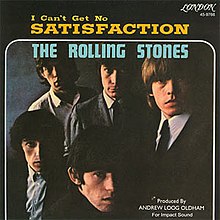(I Can't Get No) Satisfaction
| "(I Can't Get No) Satisfaction" | ||||||||||||||
|---|---|---|---|---|---|---|---|---|---|---|---|---|---|---|
 |
||||||||||||||
| Single by The Rolling Stones | ||||||||||||||
| from the album Out of Our Heads (US) | ||||||||||||||
| B-side |
|
|||||||||||||
| Released |
|
|||||||||||||
| Format | 7", 12" | |||||||||||||
| Recorded | 12 May 1965, RCA Studios, Hollywood | |||||||||||||
| Genre | ||||||||||||||
| Length | 3:44 | |||||||||||||
| Label |
|
|||||||||||||
| Writer(s) | Jagger/Richards | |||||||||||||
| Producer(s) | Andrew Loog Oldham | |||||||||||||
| The Rolling Stones singles chronology | ||||||||||||||
|
||||||||||||||
|
||||||||||||||
| "Satisfaction" | ||||
|---|---|---|---|---|
 |
||||
| Single by The Residents | ||||
| B-side | "Loser ≅ Weed" | |||
| Released | September 1976 | |||
| Format | 7" | |||
| Recorded | July 1976 | |||
| Genre | Experimental | |||
| Length | 3:54 | |||
| Label | Ralph Records | |||
| Writer(s) | Jagger/Richards | |||
| Producer(s) | Residents Uninc. | |||
| The Residents singles chronology | ||||
|
||||
| "(I Can't Get No) Satisfaction" | ||||||||||||||||
|---|---|---|---|---|---|---|---|---|---|---|---|---|---|---|---|---|
 |
||||||||||||||||
| Single by Devo | ||||||||||||||||
| from the album Q: Are We Not Men? A: We Are Devo! | ||||||||||||||||
| B-side | "Sloppy (I Saw My Baby Gettin')" | |||||||||||||||
| Released | September 1977 | |||||||||||||||
| Format | 7" | |||||||||||||||
| Recorded | July 1977 | |||||||||||||||
| Genre | New wave, experimental rock | |||||||||||||||
| Length | 3:00 | |||||||||||||||
| Label | ||||||||||||||||
| Writer(s) | Jagger/Richards | |||||||||||||||
| Producer(s) |
|
|||||||||||||||
| Devo singles chronology | ||||||||||||||||
|
||||||||||||||||
|
||||||||||||||||
"(I Can't Get No) Satisfaction" is a song by the English rock band the Rolling Stones, released in 1965. It was written by Mick Jagger and Keith Richards and produced by Andrew Loog Oldham. Richards' three-note guitar riff—intended to be replaced by horns—opens and drives the song. The lyrics refer to sexual frustration and commercialism.
The song was first released as a single in the United States in June 1965 and was also featured on the American version of the Rolling Stones' fourth studio album, Out of Our Heads, released that July. "Satisfaction" was a hit, giving the Stones their first number one in the US. In the UK, the song initially was played only on pirate radio stations, because its lyrics were considered too sexually suggestive. It later became the Rolling Stones' fourth number one in the United Kingdom.
In 2004, Rolling Stone magazine placed "(I Can't Get No) Satisfaction" in the second spot on its list of "The 500 Greatest Songs of All Time". The song was added to the National Recording Registry of the Library of Congress in 2006.
Richards recorded the rough version of the riff in a hotel room at the Fort Harrison Hotel in Clearwater, Florida. He ran through it once before falling asleep. He said when he listened back to it in the morning, there was about two minutes of acoustic guitar before you could hear him drop the pick and "then me snoring for the next forty minutes".
The Rolling Stones first recorded the track on 10 May 1965 at Chess Studios in Chicago, Illinois – a version featuring Brian Jones on harmonica. The Stones lip-synched to a dub of this version the first time they debuted the song on ABC's Shindig!. The group re-recorded it two days later at RCA Studios in Hollywood, Los Angeles, California, with a different beat and the Gibson Maestro fuzzbox adding sustain to the sound of the guitar riff. Richards envisioned redoing the track later with a horn section playing the riff: "this was just a little sketch, because, to my mind, the fuzz tone was really there to denote what the horns would be doing." The other Rolling Stones, as well as producer and manager Andrew Loog Oldham and sound engineer David Hassinger eventually outvoted Richards and Jagger so the track was selected for release as a single. The song's success boosted sales of the Gibson fuzzbox so that the entire available stock sold out by the end of 1965.
...
Wikipedia
